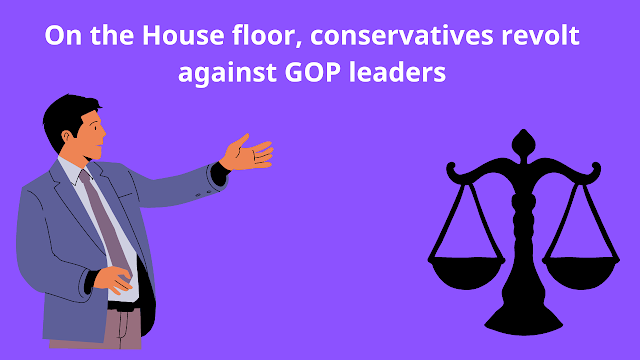House conservatives staged a revolt against Speaker Kevin McCarthy (R-Calif.)’s debt limit deal on Tuesday, resulting in a dramatic confrontation on the House floor.
The revolt led to the downfall of GOP leadership’s attempt to advance several bills. Eleven Republicans, mostly members of the conservative House Freedom Caucus, joined Democrats in voting against a rule that would have allowed four bills to move forward. This united opposition effectively killed the rule and prevented the legislation from progressing.
In a surprising turn of events, House Majority Leader Steve Scalise (R-Louisiana) changed his vote to oppose the rule, which enables him to reintroduce the rule for another vote in the near future. The final vote tally was 206-220.
Scalise huddled with more than a dozen conservatives at the back of the House in an intense effort to sway votes and push the bills forward, creating a tense atmosphere on the House floor. The routine vote on the rule, expected to last five minutes, extended to over 50 minutes.
The revolt served as a reality check for McCarthy, who had been celebrating the passage of a bill to suspend the debt limit, achieved through negotiations between House Republicans and the White House. Representative Matt Gaetz (R-Florida) expressed frustration with the functioning of the House, stating, “We took a stand in January to end the imperial Speakership, and we are concerned that the debt limit deal has violated the fundamental commitments that allowed Kevin McCarthy to assume the Speakership. The answer for us is to reassert House conservatives as the appropriate coalition partner for our leadership rather than them making common cause with Democrats.”
The revolt included conservative representatives Gaetz, Scalise, Andy Biggs (Arizona), Dan Bishop (N.C.), Lauren Boebert (Colo.), Ken Buck (Colo.), Tim Burchett (Tenn.), Eli Crane (Arizona), Bob Good (Va.), Ralph Norman (S.C.), Matt Rosendale (Mont.), and Chip Roy (Texas).
The events of Tuesday could have significant repercussions for the GOP’s plans to pass their agenda in the House, including tax reform and energy policy. The opposition from a small group of conservatives could obstruct the entire Republican agenda in the foreseeable future. The Democrats, despite their support for McCarthy in passing the debt ceiling package, may also oppose future rules, particularly those related to partisan GOP bills.
Representative Bishop emphasized the importance of restoring unity within the party, stating, “What we intend to do is to be prepared, acting in good faith, at all times to reestablish the unity that was shattered last week. Therefore, we believe that we ought to restore the successful method we used for the previous five months.”
Amidst the turmoil, Representative Andrew Clyde (R-Georgia) found himself entangled in a dispute with Scalise over his proposed gun regulation.
Clyde alleged that his bill was being impeded due to his opposition to the closed rule on the debt ceiling agreement. Despite Scalise stating that they were working to pass the regulation, Clyde remained determined to hold them accountable.
While the demands of the conservative group remain unclear, McCarthy acknowledged that the compromise bill had angered extremists from both parties. However, he viewed their opposition as evidence of a successful deal in a divided Washington.
The revolt on the House floor raises concerns about McCarthy’s ability to navigate future must-pass bipartisan bills, including those related to funding the government and preventing a shutdown. It remains to be seen whether he can maintain his Speakership and effectively utilize this strategy.

